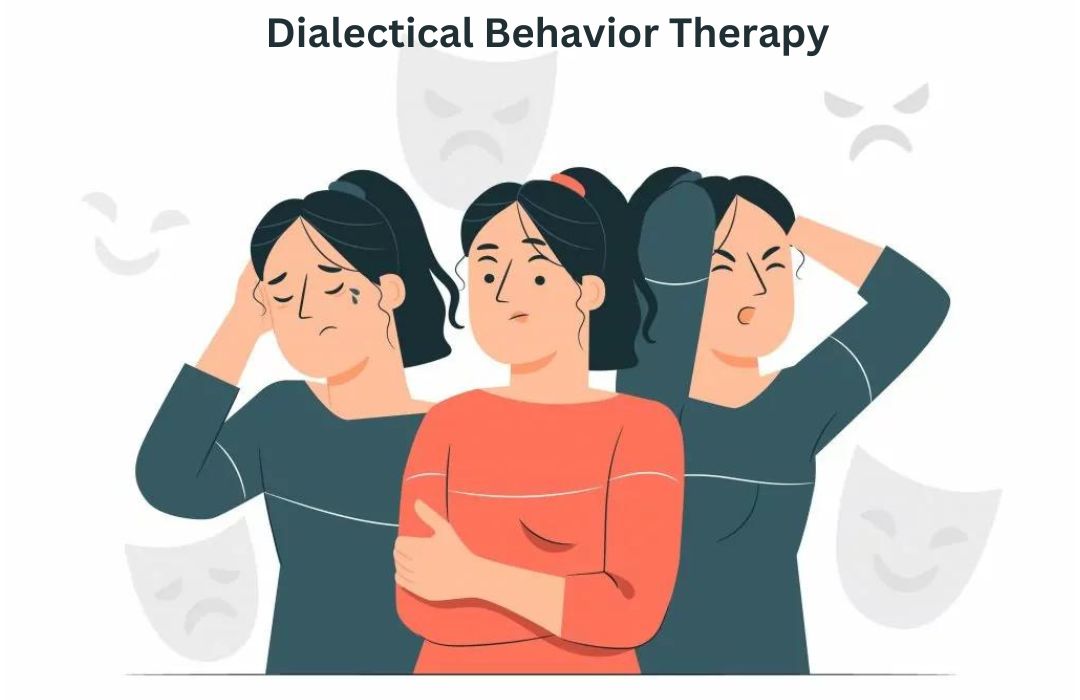Dialectical Behavior Therapy is a psychotherapy approach. It helps them develop better ways of coping. DBT was first created for borderline personality disorder. These days, it is extensively utilized to treat a variety of mental health conditions, including sadness and anxiety.This guide gives a full overview of DBT. It answers key questions like “What is Dialectical Behavior Therapy?” and “How does DBT work?” You’ll learn about DBT techniques and skills training. You’ll also learn about the benefits compared to Cognitive Behavioral Therapy.
We’ll explore practical uses for anxiety, depression, and BPD. These include therapy sessions, group therapy, and online programs.Additionally, we offer resources like DBT exercises and worksheets. We also have tips for finding a therapist. Special topics include DBT mindfulness exercises, emotional regulation skills, and approaches for teens.
What is Dialectical Behavior Therapy?
The late 1980s saw its development. Researchers designed the treatment to treat borderline personality disorder (BPD). It combines cognitive-behavioral techniques with ideas from Eastern mindfulness practices. It helps people control their emotions. It helps them deal with distress. And, it helps them build better relationships. DBT is great for people with strong emotions. They also struggle with self-harm and unstable relationships. It emphasizes self-acceptance and acceptance of one’s experiences. It also encourages proactive efforts for personal growth and change.
How does DBT work?
DBT works by combining cognitive-behavioral techniques with mindfulness. It helps people manage their emotions, make healthy coping methods, and improve relationships.
DBT is structured around four core components
Individual Therapy: Therapists deal with patients one-on-one to address personal issues. They set goals and use dialectical behavior therapy skills in real life. It’s the focus on understanding and changing problematic behaviors and thoughts.
Group Skills Training: Clients attend weekly group sessions. They go there to learn and practice DBT skills. These sessions are educational and interactive. They focus on four key skills. These are mindfulness, distress tolerance, emotion regulation, and social skills.
Therapists provide phone coaching: It helps clients apply dialectical behavior therapy skills between sessions. This is for during crises or tough moments. This quick help reinforces learning. It also encourages the use of healthy coping mechanisms.
Therapist Consultation Teams: DBT therapists meet often with a team of colleagues. They do this to support each other, improve their skills, and keep their motivation. This collaborative approach ensures that therapists provide the best possible care.
Dialectical Behavior Therapy Techniques
DBT uses many techniques. It’s helped people handle emotions. It’s also helped build skills. It’s improved relationships. Four core skill areas organize these techniques:
- Mindfulness
- Observing: Paying attention to the present moment without judgment.
- Describing: Putting words to what one observes and experiences.
- Participating: fully engages in the present moment’s activities.
- Distress Tolerance
- Crisis Survival Strategies are techniques: They help us endure short-term emotional pain without making it worse. They include distraction, self-soothing, and improving the moment.
- Reality Acceptance Skills involve practices: These include radical acceptance. They also include turning the mind and willingness to accept situations as they are. You shouldn’t try to change them.
- Emotion Regulation
- Understanding and Naming Emotions: Identifying and labeling emotions to reduce their intensity.
- Changing Emotional Responses: Use the opposite action. It’s a technique where individuals act counter to their current emotion.
- Reducing vulnerability: It means making lifestyle changes to reduce susceptibility to intense emotions. This includes getting enough sleep, eating well, and exercising.
- Interpersonal Effectiveness
- DEAR MAN: It is a strategy for assertive communication. The name stands for Describe, Express, Assert, and Reinforce. It also means: staying mindful, appearing confident, and negotiating.
- GIVE: Focuses on maintaining relationships. It stands for Gentle, Interested, Verified, and it’s an easy manner.
- FAST : It stands for self-respect. It stands for being fair, giving limited apologies, and sticking to values and the truth.
Benefits of Dialectical Behavior Therapy
DBT offers many benefits. It helps people with emotional and behavioral issues. Here are some of the key advantages:
Improved Emotion Regulation
DBT helps individuals understand, label, and manage their emotions more effectively. By using emotion regulation skills, people can reduce the intensity of their emotions. This helps to stop feelings from leading to bad behaviors.
Enhanced Distress Tolerance
Through DBT, people learn to endure crises. They don’t do this without resorting to harm. These skills help people handle tough situations better. They do this by using techniques like distraction, self-soothing, and acceptance.
Better interpersonal relationships
DBT’s interpersonal effectiveness skills improve communication and relationship-building abilities. Techniques like DEAR MAN, GIVE, and FAST help people state their needs. They also help them keep self-respect and build better relationships.
Increased Mindfulness
DBT teaches mindfulness practices. They improve awareness of the present moment. They also help with non-judgmental observation of one’s thoughts and feelings. This awareness helps individuals respond more thoughtfully rather than react impulsively to situations.
Reduced Self-Destructive Behaviors
DBT is particularly effective in reducing self-harm, suicidal ideation, and other self-destructive behaviors. DBT teaches healthier coping methods. It also gives strong therapy. It helps people find safer ways to manage their pain and distress.
Applicable to Various Disorders:
It was originally developed for borderline personality disorder (BPD). But, dialectical behavior therapy has proven effective for many mental health conditions. These include depression, anxiety, eating disorders, and substance abuse. Its versatility makes it a valuable therapeutic approach for many individuals.
Structured and supportive approach:
Dialectical behavior therapy uses individual therapy, group skills training, phone coaching, and therapist consultation teams. This structure is comprehensive and supportive. This approach has many parts. It ensures that people get consistent support and guidance in their therapy.
Focus on Acceptance and Change:
DBT uniquely balances acceptance of one’s current situation with the need for change. This approach is dialectical. It helps people accept themselves as they are. They can do this while working for meaningful and positive life changes.
DBT offers a full and structured approach. It improves its emotional and mental health. Dialectical behavior therapy focuses on acceptance, change, and practical skills. It empowers people to navigate life’s challenges and build a more fulfilling life





